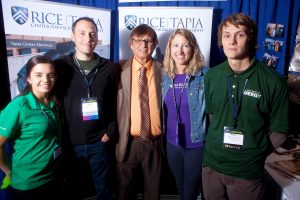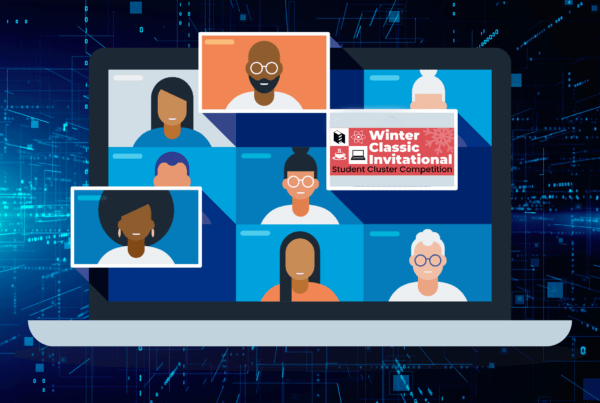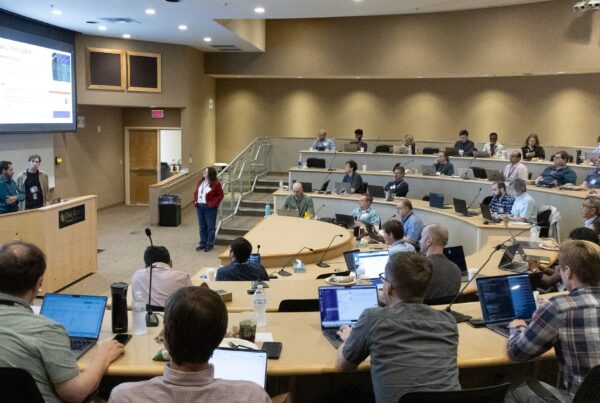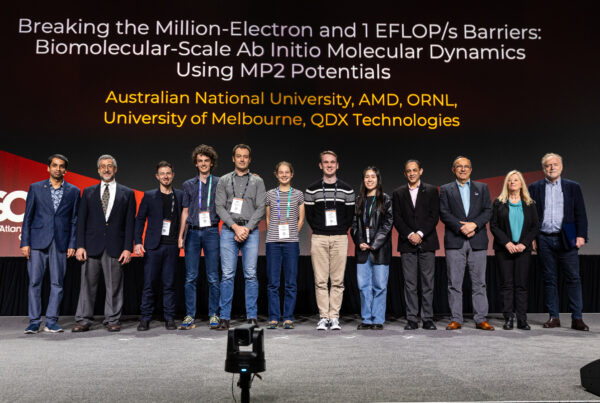
This fall, OLCF Staff members attended the 2016 Association for Computing Machinery’s Richard Tapia Celebration of Diversity in Computing conference. Pictured here are (left to right) Verónica Vergara Larrea, Bradley Szallar, Professor Richard A. Tapia, Kate Carter, and Adam Simpson.
Last month staff members from the Oak Ridge Leadership Computing Facility (OLCF) at the US Department of Energy’s (DOE’s) Oak Ridge National Laboratory (ORNL) presented for the first time at the 2016 Association for Computing Machinery’s Richard Tapia Celebration of Diversity in Computing conference, which aims to bring students and professionals together to promote diversity and create networking opportunities in computational domains.
The conference—held this year in Austin, Texas from September 14 to 17—is open to students and non-students, drawing undergraduates and graduate students as well as professionals from academia and industry. The conference is among the most diverse in computing, with the attendees being primarily from underrepresented groups.
The event included speakers from Fermilab, Lawrence Livermore, and Lawrence Berkeley National Laboratories. It also featured speakers from high-profile tech companies such as Google, Facebook, Intel, and Cisco. Daily panel discussions and workshops covered disability, Hispanics in the computing community, graduate school decisions, women in computing, and resume building.
This year staff from the OLCF, a DOE Office of Science User Facility located at ORNL, participated in the event’s career fair and led a high-performance computing (HPC) session that gave attendees access to Metis, a two-cabinet Cray XK7 system with the same architecture as Titan, the OLCF’s flagship supercomputer. One of the most important parts of the event this year was the new “HPC Day,” which included HPC sessions led by staff from multiple national laboratories.
Adam Simpson and Verónica Vergara Larrea, user support specialists at the OLCF, led a GPU-accelerated computing hands-on session, during which students became familiar with OpenACC, a programming standard for parallel computing. Simpson gave the students a code that was not parallel and walked them through OpenACC’s directives—instructions that tell the program what to do to parallelize a code and offload it to the GPU. Once he explained the directives, he gave the students an exercise and helped them determine where they should include each directive.
The best part of the conference, Vergara Larrea said, was teaching students about HPC and generating student interest. She stated that a surprising number of students showed interest in the HPC workshops this year. Approximately 1,000 people attended the 2016 Tapia conference.
Vergara Larrea also believes the “HPC Day” sessions were a great addition to the conference. “The students wanted to make sure that their code ran correctly, and they were asking many questions, which was great,” she said. “It was also good for the students at the session to know what kind of jobs are available at national laboratories and to be able to encourage them to consider potential careers in HPC.”
Simpson and Vergara Larrea hope to lead sessions at the 2017 Tapia Conference as well. In the future, the pair may incorporate OpenMP4, another programming standard that provides an interface for parallel programming, and a visualization aspect that would give students a chance to see the results of their simulation. “Hopefully, we can get even more students to sign up for the HPC session next year,” Vergara Larrea said.
Oak Ridge National Laboratory is supported by the US Department of Energy’s Office of Science. The single largest supporter of basic research in the physical sciences in the United States, the Office of Science is working to address some of the most pressing challenges of our time. For more information, please visit science.energy.gov.






